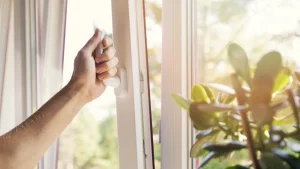You may have heard that “windows are the eyes to your home’s soul,” but did you know that they can also be a major factor in your energy costs? That’s right, those seemingly innocent panes of glass can be a source of money drainage if they are not energy efficient. The good news is that replacing your windows can lead to significant savings in the long run, but the surprising truth is that it may not always be the most cost-effective solution.
If you’re someone who is always on the lookout for innovative ways to save money, then you’ll want to keep reading. In this article, we’ll discuss the ins and outs of energy efficiency in windows, how to determine the cost-effectiveness of window replacement, and alternative solutions for improving energy efficiency. We’ll also help you with tips for maintaining vinyl replacement windows, so you can not only save money but also enhance the overall value and comfort of your home. So, let’s dive in and uncover the truth about whether window replacement really does save money.
Understanding Energy Efficiency in Windows
You might be missing out on a significant opportunity to improve your home’s energy efficiency by not understanding the role that windows play. Window insulation and thermal performance are crucial factors that determine how much energy is lost or gained through your home’s windows. Your windows may be the primary source of energy loss, which translates to higher energy bills and a less comfortable living environment.
Investing in energy-efficient windows can help you save money on heating and cooling costs in the long run. The most energy-efficient windows have triple-pane glass, low-E coatings, and gas-filled spaces between the panes. By reducing heat transfer through the windows, they help keep your home warmer in the winter and cooler in the summer. However, determining the cost-effectiveness of window replacement depends on various factors, such as the age of your current windows, the climate in your area, and the cost of energy in your region.
Determining the Cost-Effectiveness of Window Replacement
Looking to upgrade your home’s energy efficiency? Consider calculating the cost-effectiveness of replacing your windows. While new windows can be a significant investment, they can also save you money in the long run. By increasing energy efficiency and reducing heat loss, new windows can help lower your heating and cooling bills.
To determine the cost-effectiveness of window replacement, consider the window replacement ROI, or return on investment. This calculation involves comparing the initial cost of the new windows to the amount saved on energy bills over time. While the initial cost may be high, the long-term savings can make it a worthwhile investment. Additionally, new windows can increase the value of your home, further adding to their cost-effectiveness.
Transitioning into the subsequent section about alternative solutions for improving energy efficiency, there are other options to consider beyond window replacement.
Alternative Solutions for Improving Energy Efficiency
If you’re searching for other ways to enhance energy efficiency in your home, this section offers a variety of alternatives like a fruit platter with a range of options to choose from. One of the most popular green technologies for energy efficiency is solar panels. Solar panels are a great way to reduce your reliance on traditional electricity and save money on your energy bills. They work by harnessing the power of the sun and converting it into usable electricity. While the initial cost of installing solar panels may be high, the long-term savings can be significant. Additionally, there are many DIY options for installing solar panels, making them accessible to a wider range of homeowners.
Another green technology that can improve your home’s energy efficiency is a smart thermostat. Smart thermostats use sensors to detect when you are home and adjust your heating and cooling accordingly. This can lead to significant energy savings over time, as you won’t be wasting energy heating or cooling an empty house. Additionally, many smart thermostats can be controlled remotely via your smartphone, allowing you to adjust the temperature from anywhere. Other DIY options for improving energy efficiency include adding weather stripping around doors and windows, insulating your attic, and upgrading your light bulbs to energy-efficient LED bulbs. These options may not be as flashy as solar panels or smart thermostats, but they can still make a significant difference in your home’s energy efficiency and ultimately save you money on your energy bills.
When it comes to choosing the right windows for your home’s needs, there are a few important factors to consider.
Choosing the Right Windows for Your Home’s Needs
Choosing the right windows for your home can greatly enhance energy efficiency and contribute to a more comfortable living space. When considering window replacement, it is important to choose the right materials and installation options for your specific needs. Here are some factors to consider:
- Energy efficiency: Look for windows with a high Energy Star rating to ensure maximum efficiency and cost savings on your energy bills.
- Durability: Consider the longevity of the window materials and how they will hold up against weather and wear and tear over time.
- Style: Choose windows that not only fit the aesthetic of your home, but also provide the functionality and features that you desire, such as easy cleaning or noise reduction.
In addition to these factors, it is important to consult with a professional to determine the best window options for your home. Proper installation is also crucial for maximizing energy efficiency and ensuring the longevity of your new windows. Consider seeking out a certified installer with experience in the specific window materials you have chosen. By taking the time to carefully choose and install your new windows, you can enjoy the benefits of improved energy efficiency and a more comfortable living space.
Conclusion
Congratulations! You’ve made it to the end of the article and now you’re wondering, does window replacement really save money? The answer is yes, but it’s not as simple as just replacing your windows. You need to understand energy efficiency and determine the cost-effectiveness of the replacement.
But don’t worry, there are alternative solutions for improving energy efficiency if window replacement isn’t the right choice for you. And when you do decide to replace your windows, make sure to choose the right ones for your home’s needs. It may seem daunting, but with the right information and guidance, you can make an informed decision that will save you money in the long run. So go ahead, take the leap and enjoy the benefits of energy-efficient windows. Your wallet (and the environment) will thank you!
You May Also Like:


